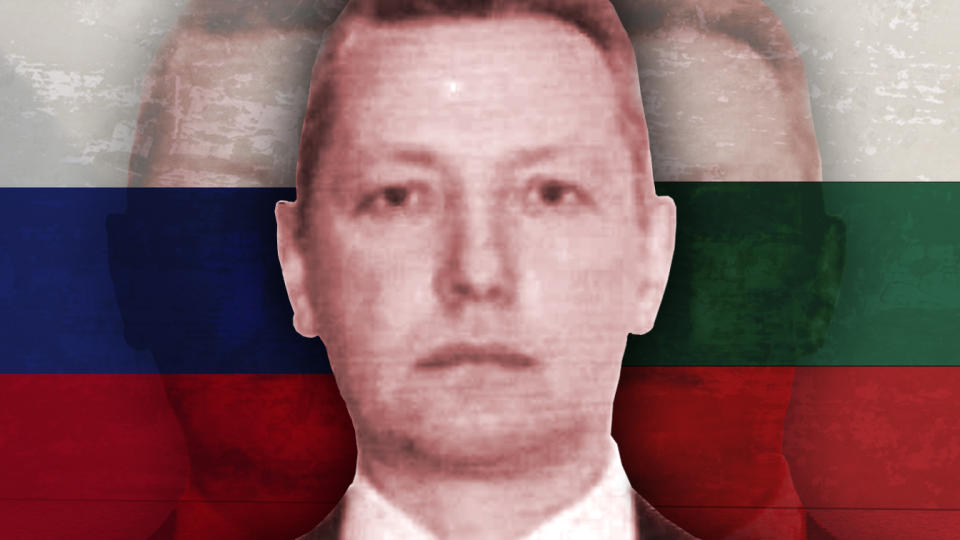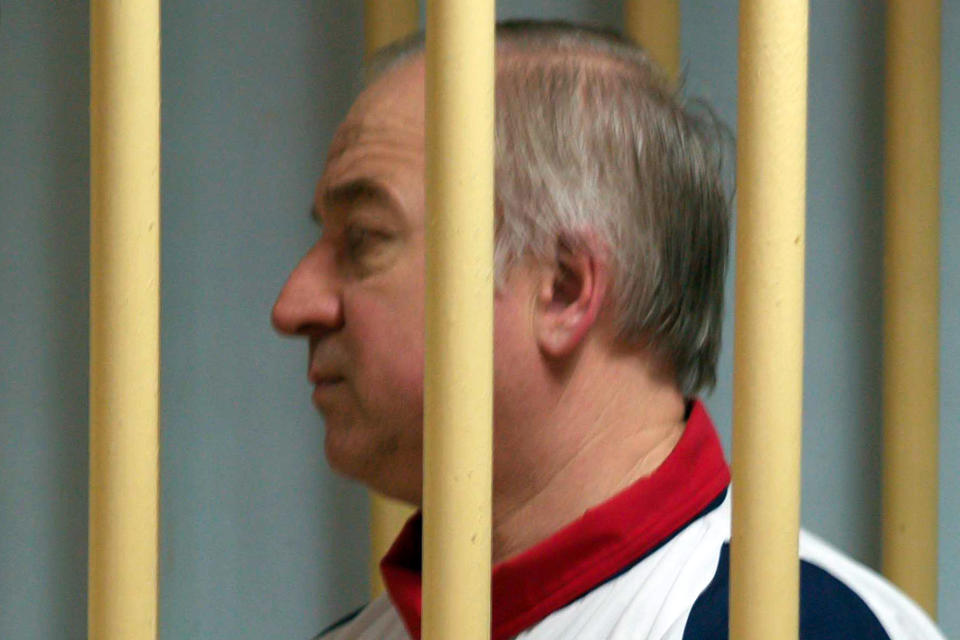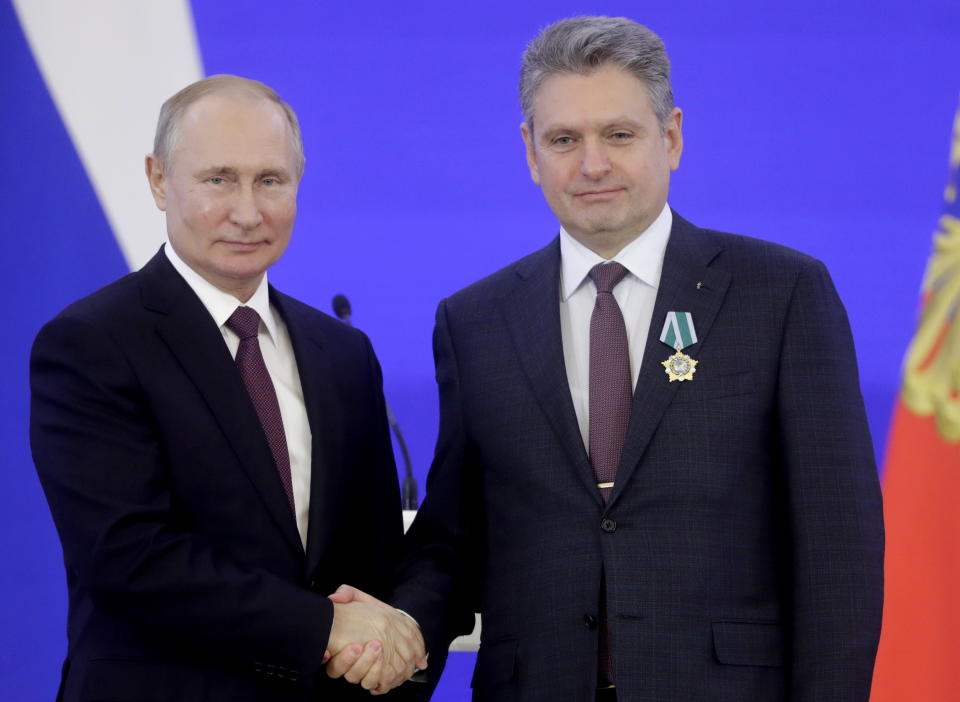NATO ally expels undercover Russian spy

WASHINGTON — On Oct. 30, the Bulgarian Foreign Ministry delivered a rare warning to a Russian diplomat stationed in Sofia, the capital: Leave the country within 24 hours.
The expelled diplomat, Vladimir Anatolyevich Rusyaev is affiliated with the Russian military intelligence service, or the Main Directorate of the General Staff of the Armed Forces of the Russian Federation, commonly known as the GRU, according to a Western intelligence source.
The intelligence source provided Yahoo News with a document describing Rusyaev’s career history, including a current photograph.
Rusyaev has returned to Moscow, where he lives, according to the document.
Bulgarian Prime Minister Boyko Borissov identified the expelled spy as a first secretary in the Russian embassy, but did not provide a name. Borissov said he had attempted to recruit a head of a Bulgarian special service with access to classified information about Bulgaria, the European Union, and NATO.
The Bulgarian Ministry of Foreign Affairs declined to comment on Rusyaev’s case, and the Russian Defense Ministry and Russian Embassy in Bulgaria did not respond to a request for comment.
While the expulsion of Russian spies from Eastern European countries, particularly NATO allies, is nothing new, it’s more unusual for Bulgaria, which has traditionally had friendlier relations with Moscow, to do so publicly, and may be in response to U.S. intelligence efforts.
According to Marc Polymeropoulos, a recently retired senior CIA senior operations officer who was responsible for overseeing operations in Europe and Russia, the CIA under director Gina Haspel has redoubled pressure on allies to respond to Russian aggression. “The. U.S. government has been pushing our partners across the globe to counter a variety of Russian intelligence activity, both traditional espionage operations as well as the malign influence operations of the Russian intelligence services such as the GRU,” he told Yahoo News.
Rusyaev, whose name appears to have only surfaced in a single Bulgarian-language news outlet, is the latest in a long string of GRU officers exposed and expelled from Western countries in recent years for spying or mounting aggressive covert operations against Western targets, revealing Russian President Vladimir Putin’s willingness to encourage aggression and boldness in his operators overseas.

GRU officers were publicly found responsible for the March 2018 nerve agent attack on former Russian intelligence officer Sergei Skripal, attempted cyberattacks directed at the Dutch Organization for the Prohibition of Chemical Weapons, as well as hacking into computers belonging to Hillary Clinton’s presidential campaign, according to a July 2018 indictment from the Justice Department.
"It is always a good thing when the Russians get caught spying, particularly when their efforts to suborn a NATO ally are thwarted,” said Mark Kelton, one of the CIA’s former top counterintelligence chiefs.
“The GRU's attempt to recruit a senior intelligence officer is in keeping with their past actions, which have often been more aggressive and less well conceived than those of their sister Russian services,” he continued.
The GRU has also attempted to infiltrate a range of European countries to access classified information, some of which, including the Baltic countries, Poland and Norway, for example, have been open about exposing and either convicting them or expelling them within recent months and years.
When British authorities identified GRU officers caught poisoning former Russian intelligence officer Sergei Skripal and his daughter, a coalition of Western nations united to expel Russian diplomats in large numbers in retaliation in the spring of 2018.
However, there were a few nations that declined to participate, including Bulgaria, which cited the need to “keep the communication channel” open with Russia during an “over-tensed situation.”
Bulgaria has closer relations to Russia than other NATO and EU countries, and generally attempts to avoid antagonizing Moscow.
“Bulgaria tiptoes a fine line,” wrote Mark Galeotti, an expert in Russian intelligence services and the principal director of boutique consulting firm Mayak Intelligence, in an email to Yahoo News. “This is a country with a strong shared heritage with Russia yet also a member of the EU and NATO. As such, it tends to be lukewarm on joining collective displays of resistance to Russian adventurism, but it will still defend its own interests when it feels it must.”
Russian officers have tested those limits previously.
“Usually they do something if [Russian officers] cross the line,” said another Western intelligence official who did not know specific details about the Bulgarian case. “But the line is high.”
Russian officials are also conscious of maintaining alliances with Bulgaria.
“The fact that the Russians have, to date, not retaliated against Bulgaria is indicative of a desire not to let this event further damage relations between Sofia and Moscow,” said Kelton.

According to the Western intelligence source who provided his name, Rusyaev had previously been stationed in Barcelona, Spain, and Buenos Aires, Argentina, where much of his public-facing work concerned working on cultural issues and support for Russian youth and foreign exchange students, positions that put him in touch with officials in Vladimir Putin’s office at times.
Targeting young people is something GRU officers have done in places like Hungary, wrote Galeotti, “to build links with potentially useful assets and also to talent-spot the kind of young people who might then go on to join the military, police and the like.”
The exposure of Rusyaev’s attempted recruitment and his subsequent expulsion is just the latest public embarrassment for the GRU, whose specific efforts have been revealed by government entities and investigative media outlets like Bellingcat. However, the service continues to operate unimpeded. Foreign officials have privately mocked the GRU for its mistakes, but simultaneously worry that for every failure, there are a number of successful operations that go undetected.
Rusyaev was not the only person caught spying on behalf of Russia in Bulgaria in recent months. According to news reports, a former Bulgarian politician named Nikolai Malinov recently went to Moscow and received a personal commendation from Russian President Vladimir Putin after he was charged by Bulgaria with passing state secrets to Russian organizations.
Additionally, Russian adventurism in Bulgaria may go beyond traditional espionage.
Earlier this year, British investigators traveled to Sofia to dig into the mysterious poisoning of a Bulgarian arms dealer in 2015, an attack they believed could be linked to the similar poisoning of Skripal —potentially motivated by Russian attempts to control Bulgarian defense industry licenses. The investigative media outlet Bellingcat has linked some of the same GRU officers that were present for the Skirpal attack to the poisoning in Bulgaria.
“The U.S. government and our foreign partners are seeking to hold the GRU accountable for their forays into lethal operations, which we have seen in the U.K. and also in Bulgaria, which may have even been a testing ground for the attack on Sergei Skripal in the U.K.,” said Polymeropoulos, the recently retired former senior CIA officer.
It’s an issue the U.K. still follows closely. While the British Embassy in Bulgaria did not offer a specific comment in response to Bulgaria’s decision to expel Rusyaev, it posted a tweet noting that “the U.K. supports Bulgaria’s efforts as a reliable European partner and NATO ally who has the sovereign right to respond to threats to its national security.”
_____
Download the Yahoo News app to customize your experience.
Read more from Yahoo News:


